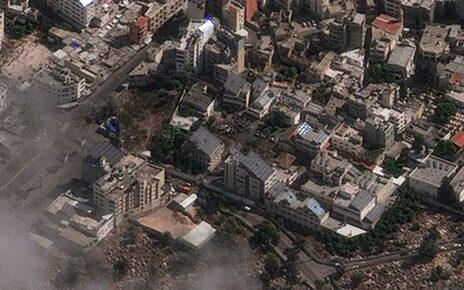In his last year in office, China’s Premier Li Keqiang attempted to cast himself as the rational counterbalance to Xi Jinping’s ideological crusade. By Sunday, in his last major speech, it was clear he had failed.
The Chinese government is now in the midst of centralising control around the Communist Party and Xi Jinping, fusing the state around the party and the party around Xi.
Chinese President Xi Jinping at the National People’s Congress on Sunday. Credit:Getty
Li mentioned Xi Jinping a record 17 times in the hour-long speech to the National People’s Congress in Beijing on Sunday, compared to five mentions in his first speech in 2014.
When former premier Wen Jiabao gave his last speech in 2013, he did not mention the outgoing President Hu Jintao once. In 2012, after almost a decade in power, he was name-checked twice.
In the opaque world of Chinese elite politics, where words are weighted and obfuscated by lofty metaphors, repetition has value. So does omission.
In 2014, Li introduced his annual Work Report on the progress that had been made in the past year by praising “the leadership of the Central Committee of the Communist Party of China with Comrade Xi Jinping as General Secretary”. Xi, who had yet to purge all of his rivals, was young and ambitious but still a first among equals. Then he moved fast.
By 2016 this communal group had become “headed by General Secretary Xi Jinping”. It only took another year for it to become the “leadership of the Central Committee with Comrade Xi Jinping at its core” in Li’s report. The distinction paved the way for Xi to elevate his own theory to the Communist pantheon, making any threat to Xi a threat to the Party itself.
The last time Li mentioned Xi’s predecessors through their theories Mao Zedong Thought and Deng Xiaoping Theory was five years ago, now there is just Xi Jinping Thought, a dense 515-page tome on the theory of China’s modernisation that puts the party and by extension Xi at the centre of China’s economic, political and social development.
In practice, this means by the end of the National People’s Congress this week many of the functions that may have in the past been performed by state bureaucrats will increasingly be run by party apparatchiks. Think of the Labor Party (the national secretariat not parliamentary MPs) running the Attorney General’s department and the Australian Tax Office, and it will give you a sense of the scale of some of these developments in a country of 1.4 billion.
Nis Grünberg, the lead analyst at the Mercator Institute for China Studies said Xi would look to consolidate his power in China’s government by filling critical posts including the National Development and Reform Commission, the top economic-planning body, the People’s Bank of China, and the Ministries of Finance and of Science and Technology.
“The appointment of key Xi Jinping loyalists in the state apparatus, [will give] the third-term president the confidence the administration will support his program,” he said.
A screen displays a news broadcast of Li Keqiang, China’s premier, during the opening of the First Session of the 14th National People’s Congress (NPC) at the Great Hall of the People in Beijing.Credit:Bloomberg
“The administrative restructuring will further institutionalise Communist Party oversight over policymaking, with the areas of financial policy and national security, in particular, being put on a shorter leash.”
Alfred Wu, an assistant professor at the Lee Kuan Yew School of Public Policy, believes Xi will go further by kneecapping the responsibility of ministers in key portfolios.
“He wants to have committees like internal affairs and financial and economic affairs. These committees will be directly under Xi. They will no longer only report to the minister.”
Wu believes this layer will mostly come from below the cabinet-level standing committee and be drawn from the Politburo as well as some local officials.
“He’s a control freak, so power will be more concentrated in him. He will be able to give an order through his trusted people and then to the minister,” he said. “He’s number one, the other people just help.”
Sources close to Li spent considerable time last year in international business publications attempting to frame a narrative that he was behind decisions that pulled back on some of Xi’s worst impulses including crackdowns on private technology, property developers and the authoritarian zeal of Xi’s COVID-19 lockdown strategy.
On Sunday, Li used 26 pages of his annual Work Report talking about the past and only six about the year ahead. Out of power and into retirement Li could only make “recommendations for the work of government in 2023”.
“The best guess is that the report was prepared by the outgoing premier’s team, who will have little say in the new government,” observed Chen Long, a partner at research firm Plenum China.
The 67-year-old came to power as premier a decade ago as part of a deal between Xi and former president Hu’s Communist Youth League Faction.
Both have now been vanquished. So have many of the restraints on Xi’s policies.
Get a note directly from our foreign correspondents on what’s making headlines around the world. Sign up for the weekly What in the World newsletter here.
Most Viewed in World
From our partners
Source: Read Full Article



